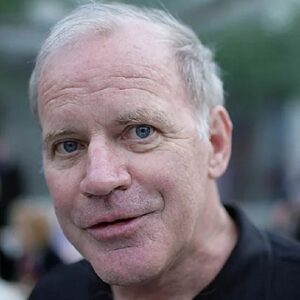Kary B. Mullis is an American biochemist, author, and lecturer who shared the 1993 Nobel Prize in Chemistry for his work developing the polymerase chain reaction (PCR) technique. The same year, he was also awarded the Japan Prize. His contribution to the PCR technique was instrumental in establishing it as a standard technique in biochemistry and molecular biology. As an outspoken individual, he has drawn considerable criticism for defending AIDS denial and climate change denial, as well as for his unconventional views on social sciences. Born into a farming family, he was raised in a rural area and spent his childhood observing farm animals and other organisms. As a young boy, he developed an interest in chemistry and went on to earn a Bachelor of Science (BSc) in chemistry from the Georgia Institute of Technology in Atlanta. After earning a PhD in biochemistry from the University of California, Berkeley, he worked as a pediatric cardiology fellow at the University of Kansas Medical School and then completed two years of postdoctoral work in pharmaceutical chemistry at the University of California, San Francisco. He experimented with a variety of occupations before landing a job as a DNA chemist at Cetus Corporation in California. It was here that he conducted the ground-breaking research that resulted in the development of the polymerase chain reaction (PCR) technique.
Childhood & Adolescence
Kary Banks Mullis was born in Lenoir, North Carolina, on December 28, 1944, to Cecil Banks Mullis and Bernice Alberta Barker. Theirs was a loving family, and he developed a strong attachment to his grandparents. His family was agriculturists, and he enjoyed observing farm animals and other living organisms.
He attended Dreher High School and developed an interest in chemistry during his time there. He later attended the Georgia Institute of Technology in Atlanta, earning a Bachelor of Science (BSc) degree in chemistry there in 1966. By now, he had married for the first time and established a business.
He then continued his education at the University of California, Berkeley, where he worked in J. B. Neilands’ laboratory, where he concentrated on the synthesis and structure of bacterial iron transporter molecules. He earned his PhD in 1972 and taught biochemistry at the university until 1973.
Career of Kary B
Kary B. Mullis then worked as a pediatric cardiology postdoctoral fellow at the University of Kansas Medical School, where he concentrated on angiotensin and pulmonary vascular physiology. In 1977, he began a two-year postdoctoral fellowship at the University of California, San Francisco in pharmaceutical chemistry.
In the interim, he considered abandoning his career in science and worked for two years as a baker. However, his friend Thomas White urged him to return to science.
In 1979, he joined the Emeryville, California-based biotechnology company Cetus Corporation as a DNA chemist. He began his seminal work on oligonucleotide synthesis there, which eventually resulted in his improvements to the polymerase chain reaction (PCR).
At the time, obtaining a specific sequence of DNA in sufficient quantity for study was not only extremely difficult, but also time-consuming and expensive. Mullis invented PCR in 1983 by improving on previously known methods.
His technique, which multiplies a single microscopic strand of genetic material billions of times in a matter of hours, is of critical importance to the scientific community and is widely regarded as one of the most significant scientific achievements of the twentieth century.
The polymerase chain reaction (PCR) has a wide range of applications in medicine, genetics, biotechnology, and forensics.
He was the director of molecular biology at Xytronyx Inc. in San Diego from 1986 to 1988, where he concentrated on DNA technology and photochemistry.
He also began consulting on nucleic acid chemistry for over a dozen companies at this time, including Angenics, Cytometrics, Eastman Kodak, Abbott Laboratories, Milligen/Biosearch, and Specialty Laboratories.
In 1992, he founded a company to sell jewelry containing amplified DNA from deceased celebrities such as Elvis Presley and Marilyn Monroe.
Mullis serves on the scientific advisory boards of several companies, provides expert testimony in DNA-related legal matters, and is a member of the Advisory Board of the USA Science and Engineering Festival. He also frequently lectures on college campuses and at academic conferences around the world.
Significant Works of Kary B.
Kary B. Mullis is credited with inventing the polymerase chain reaction (PCR), a technique used in molecular biology for amplification of a single copy or a few copies of a piece of DNA by several orders of magnitude. This is a critical technique that is used in medical and biological research laboratories for a variety of purposes.
Awards and Accomplishments
Prior to receiving the Nobel Prize, he received the American Society of Human Genetics’ William Allan Memorial Award (1990), the German Society of Clinical Chemistry’s Preis Biochemische Analytik and Boehringer Mannheim (1990), and the California Scientist of the Year Award (1990). (1992).
Kary B. Mullis shared the 1993 Nobel Prize in Chemistry with Michael Smith “for his fundamental contributions to the establishment of oligonucleotide-based, site-directed mutagenesis and its development for protein studies.” He was also awarded the Japan Prize for developing the polymerase chain reaction in 1993.
Personal History and Legacies
Kary B. Mullis is the mother of three children and has been married four times. He is married to Nancy Cosgrove at the moment. He is an avid writer and surfer.
Estimated Net Worth
Kary B. Mullis estimated net worth is to be $1 million.


